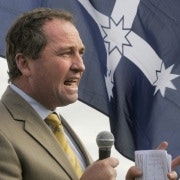When's a good time to introduce a great, big new tax?
The chorus has been building for months from Coalition figures across the country: “now is not the time to introduce a carbon tax.” And it's now swelling to a crescendo.
“This is the worst possible time to be introducing the world's biggest carbon tax,'' said Tony Abbott yesterday. “I cannot think of a worse time to be introducing the biggest economy wide carbon tax in the world,” tweeted Joe Hockey on Sunday. “Now is not the time to introduce the world's largest carbon tax,” piped up Bruce Billson this morning.
Backbenchers had got the memo. Now “was the worst possible time to introduce a carbon tax,” Natasha Griggs said on Friday, the same day that Josh Frydenberg opined “there could not be a worse time for the Gillard government to introduce a punishing new carbon tax.”
Even the government's critics in the commentariat were getting in on the act. “Has there ever been worse timing for the introduction of a great big new tax?” inquired Stephen Bartholomeusz at Business Spectator yesterday.
With unemployment below 5 per cent, the RBA cash rate at 3.75 per cent, CPI at 1.6 per cent and about a quarter of a trillion dollars in investment commitments pouring into the resources sector, you might wonder exactly what economic indicators need to look like for there to be a good time to introduce a carbon tax.
When is a good time to introduce any economic reform? When times are crook and the need for reform is urgent? The Hawke government launched a round of major tariff reform in March 1991. Unemployment was over 9 per cent (and proceeded to rise to 11 per cent), the RBA cash rate was 12 per cent (the days when monetary policy really did do the heavy lifting) and inflation was 5 per cent. Hawke, Keating and Button never flinched, as tens of thousands of manufacturing workers who lost their jobs can attest. Imagine the hysterical reaction to that sort of reform today.
Or what about when ‘the economic sun is shining'? The Howard government had a whole term of booming revenues, falling unemployment control of the Senate and did nothing with it except attack unions via WorkChoices and give handouts.
But then the Coalition would argue this isn't a major economic reform, it's just a great big new tax. So when is the right time to introduce a great big new tax? The Coalition would know, because that's what it did in 2000 with the GST, which in CPI terms was more than three times bigger than the estimated impact of the carbon price.
When the GST was introduced, the Australian economy looked very different. Unemployment was over 6 per cent, on a participation rate nearly two points lower. The RBA cash rate was 6 per cent. CPI (before a year-long spike caused by the GST) was 3.2 per cent. The Westpac Melbourne Institute Index of Consumer Sentiment had gone deep into negative territory, hitting -6.8 in March and -4.2 and -3.7 in May and June (in comparison, it hit -5 in March this year and most recently was 0.8). And if we've got a stockmarket jittery about Europe and the US, in June 2000 we were three months into the Tech Wreck (and on the eve of a Federal Reserve-induced US recession).
In short, if now's a bad time to introduce a carbon price estimated to have ~0.7 per cent impact on CPI, mid-2000 was an absolute shocker of a time to introduce a GST that caused a 2.5 per cent CPI impact. The only unalloyed positive was the dollar, which was around US$0.58, much to the chagrin of those who think the currency is a kind of national phallic symbol, but to the delight of exporters.
Of course, the Howard government didn't flinch. And correctly. Its implementation of the GST was a model of reform, from taking it to an election (in which Labor out-polled it, and that almost cost it government) to resisting the endless demands of rent seekers and special interests calling for exemptions and differential treatment. Only when it was forced to deal with Meg Lees did it compromise on the quality of the policy (Lees, it's now forgotten, bolted to London in July 2000, leaving Natasha Stott Despoja to have to deal with the political fallout of any implementation issues).
And throughout, Labor was every bit as negative and opportunistic as Abbott has been on the carbon price – but with the crucial exception that Howard had secured re-election on a GST commitment and had a clear mandate for the GST. Indeed, Abbott is now closely following the Beazley template and shifting his rhetoric as the commencement date approaches and it becomes clear that his claims about the impact of the carbon price are wildly overblown.
Beazley began referring to the “slow burn” of the GST (a phrase he'd later, and more accurately, use about WorkChoices). Abbott has gone for the more colourful metaphor of the python squeeze versus the cobra strike but, snakes or fires, the same logic applies.
However, a key difference, apart from the democratic legitimacy of Howard's GST and News Limited cheerleading for the government, is that Beazley never wedded himself to repealing the GST in the way Abbott has with his pinky promise about repealing the carbon price. That may yet have ramifications between now and August 2013, which in political terms remains a very long way off.
This article was originally published by Crikey on June 5. Republished with permission.













